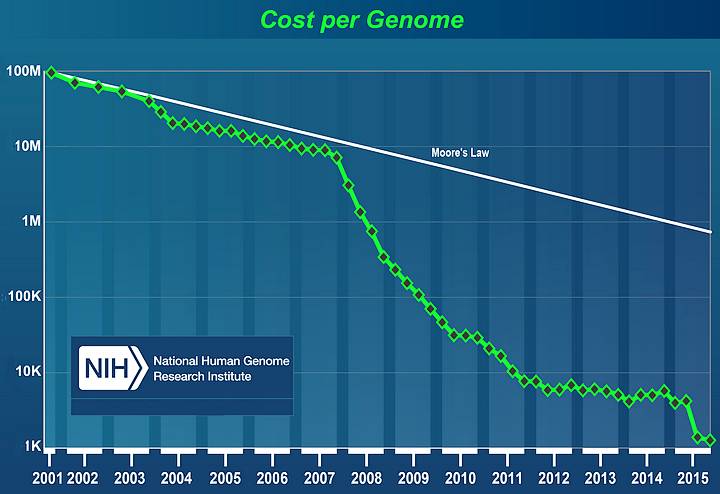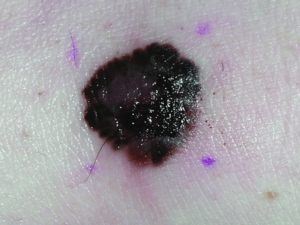 Over the years, the original high cost of genetic screening has fallen faster than accepted technology laws suggested.
Over the years, the original high cost of genetic screening has fallen faster than accepted technology laws suggested.
Genetic testing has risen in popularity, for DNA based family research and medical diagnosis. Consumer based services have attracted notes of caution, although well managed medical testing is valuable.
This needs to be based on proven links and can be for melanoma. Mutations in the CDKN2A gene are a clear pointer to the likelihood of melanoma, with carriers having a lifetime risk in the range of 60% to 90%.
Positive tests are uncommon and only represent about 10% of the total number diagnosed with melanoma but the higher risk is evident. More so if you have pointers which add to reasons for a genetic test.
At Risk Groups
Genetic testing for those who have had a melanoma can make sense, understanding why this occurred helps to plan for the future. There are also specific groups which should consider testing before a melanoma develops:
- Those with a family history of melanoma, on either side of the family.
- Anyone with a large number of moles, or atypical moles, such as Spitz nevi.
- Where a dermatologist has identified other symptoms which suggest FAMMM.
FAMMM is Familial Atypical Multiple Mole Melanoma Syndrome, an inherited condition. This is typically characterized by the presence of multiple moles on your body, although there can be other symptoms.
There could be uncommon reasons, CDKN2A mutation has a link with the possibility of contracting pancreatic cancer, or a family history of this, which can again point to increased likelihood of melanoma.
Should I Be Tested?
If you are in an at risk group, or a consultant dermatologist particularly recommends this, the answer is yes. Melanoma may be lethal without early treatment.
A positive genetic test for melanoma can see a personalised skin cancer screening program put in place. This helps to guarantee the early detection which makes melanoma a lesser issue and offers peace of mind.
We should still bear in mind that CDKN2A, or related gene mutations are relatively rare and a general population screen is not a priority.
Most people get melanoma, or need skin cancer treatment for other reasons, sun exposure, tanning beds, excessive sunburn in earlier years, immune system issues. Those reasons can however multiply the chance of melanoma if you have a natural liability.
Our London clinics can arrange testing for you. We would suggest that you first speak to a dermatologist during a visit, or give our friendly staff a call, if you would like any further information.
You may find the options below useful:
- Save time with an intuitive search on: Skin Cancer Diagnosis & Treatment.
- Up to date news, research and insights: Our Dedicated Skin Cancer Blog.
- Why melanoma is seen to hold a particular: Rationale For Genetic Testing.
For any advice, or to arrange a dermatology appointment, call 020 8441 1043, or send an email via the Make An Appointment button below.



